The Artificial Intelligent Packaging Market is estimated to be valued at USD 2.6 billion in 2025 and is projected to reach USD 6.9 billion by 2035, registering a compound annual growth rate (CAGR) of 10.1% over the forecast period. Each technology segment contributes to the overall growth through enhancements in operational efficiency, real-time monitoring, and improved product traceability. Smart sensors and embedded electronics are expected to account for a substantial share of market value, enabling real-time condition monitoring, temperature control, and spoilage detection in perishable goods. Intelligent labeling solutions, including QR codes and dynamic visual indicators, provide both brand engagement and functional tracking, contributing to incremental adoption across food, pharmaceuticals, and logistics applications. Machine vision and AI analytics platforms, integrated into packaging lines, allow predictive maintenance, automated quality control, and error reduction, enhancing overall throughput and operational value. Over the forecast period, technological convergence drives the shift in contribution proportions, with sensors and analytics gradually representing 40–45% of the total market by 2035. The intelligent labeling maintains steady adoption, representing around 25–30% of market share.
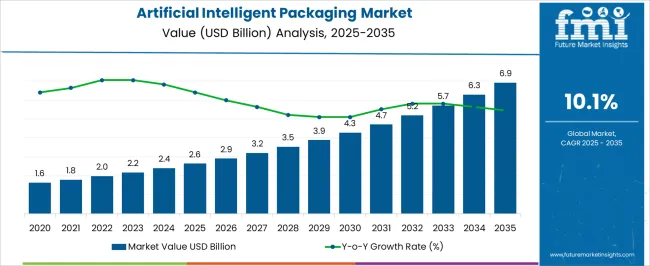
| Metric | Value |
|---|---|
| Artificial Intelligent Packaging Market Estimated Value in (2025 E) | USD 2.6 billion |
| Artificial Intelligent Packaging Market Forecast Value in (2035 F) | USD 6.9 billion |
| Forecast CAGR (2025 to 2035) | 10.1% |
The artificial intelligent packaging market is expanding steadily, driven by growing demand for smart packaging solutions that enhance monitoring and safety in various industries. Technological advancements in sensors and IoT integration have enabled packaging systems to provide real-time data on product conditions, thereby improving supply chain transparency and reducing losses.
Increasing regulatory focus on product safety and traceability has further accelerated adoption. Industry shifts toward digital transformation and automation in logistics and storage have created new opportunities for intelligent packaging applications.
Rising concerns over environmental sustainability and product freshness have also contributed to innovation in packaging materials and technologies. The market outlook is promising as companies invest in smart solutions that combine functionality with data analytics. Segmental growth is expected to be driven by Fixed Roof products and the crude oil sector, where packaging must ensure the safe storage and transport of sensitive materials.
The artificial intelligent packaging market is segmented by product, end use, and geographic regions. By product, the artificial intelligent packaging market is divided into Fixed roof, Floating roof, Spherical, and Others. In terms of end use, the artificial intelligent packaging market is classified into Crude oil, Gasoline, Aviation fuel, Middle distillates, LNG, and LPG. Regionally, the artificial intelligent packaging industry is classified into North America, Latin America, Western Europe, Eastern Europe, Balkan & Baltic Countries, Russia & Belarus, Central Asia, East Asia, South Asia & Pacific, and the Middle East & Africa.
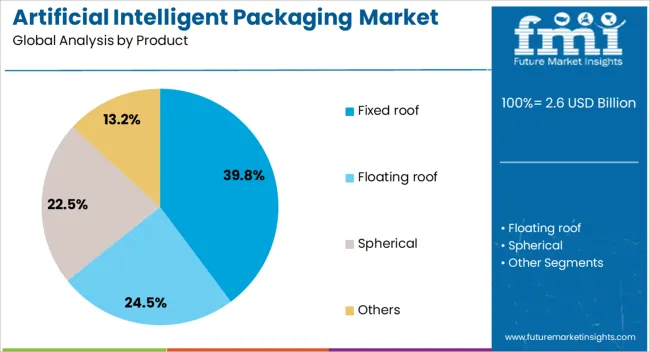
The Fixed Roof segment is projected to account for 39.8% of the artificial intelligent packaging market revenue in 2025, leading among product types. This segment has grown due to its robust design that ensures secure containment and monitoring of liquids and gases in industrial settings.
Fixed roof packaging solutions are valued for their stability and ease of integration with sensor technologies that track temperature, pressure, and other critical parameters. The durability and reliability of fixed roof systems have made them preferred for long-term storage and transportation.
Their ability to maintain product integrity over extended periods aligns with industry demands for reducing spoilage and contamination. As industries adopt intelligent monitoring tools, fixed roof packaging continues to gain traction as an effective solution.
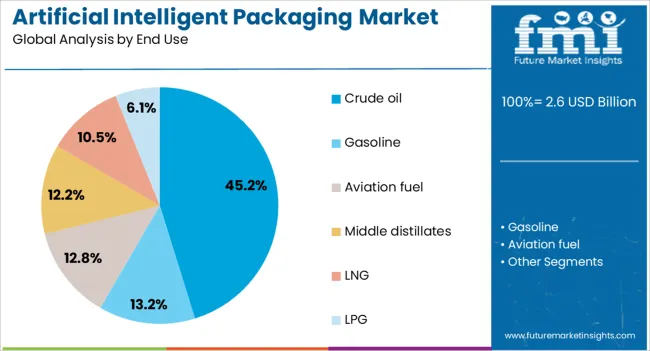
The Crude Oil segment is expected to hold 45.2% of the market revenue in 2025, dominating the end-use applications. This segment’s expansion is driven by the critical need to monitor and preserve crude oil quality during storage and transportation.
Intelligent packaging systems in this sector help detect leaks, contamination, and temperature fluctuations, which are crucial for maintaining product value and safety. Increasing offshore and onshore crude oil production activities have intensified the demand for advanced packaging solutions that provide real-time data and early warning alerts.
Regulatory compliance and environmental safety standards have further pushed adoption in this sector. With the crude oil industry focused on operational efficiency and risk mitigation, the segment is anticipated to sustain its leadership in the artificial intelligent packaging market.
The artificial intelligent packaging market has been expanding due to increasing demand for smart, connected, and interactive packaging solutions across food, beverage, pharmaceutical, and consumer goods sectors. AI-enabled packaging has been widely utilized to monitor freshness, track product movement, prevent counterfeiting, and provide consumer engagement. Market growth has been supported by advances in sensors, RFID tags, QR codes, machine learning algorithms, and IoT integration. Rising focus on supply chain visibility, product safety, and personalized consumer experiences has further strengthened adoption globally.
The growing need for efficient supply chain management and product monitoring has been a primary driver of the artificial intelligent packaging market. AI-enabled packaging allows real-time tracking of location, temperature, humidity, and movement of products from manufacturing facilities to retail shelves. This data has enabled stakeholders to reduce spoilage, optimize inventory management, and minimize logistical inefficiencies. Smart packaging solutions with integrated sensors and RFID technology have been deployed to provide actionable insights for distributors and manufacturers, improving operational decision-making. Additionally, AI algorithms analyze collected data to predict potential delays, detect damages, and enhance delivery reliability. These capabilities have strengthened the deployment of intelligent packaging solutions across food, beverage, pharmaceutical, and high-value consumer goods industries, ensuring product quality and safety throughout the supply chain.
Technological advancements have significantly enhanced the functionality, connectivity, and intelligence of packaging solutions. Sensors, smart labels, RFID chips, QR codes, and NFC tags have been integrated to monitor environmental conditions, detect tampering, and provide real-time product data. Machine learning and AI platforms have enabled predictive analytics for shelf life, demand forecasting, and spoilage prevention. Interactive packaging with digital interfaces has been developed to improve consumer engagement, provide nutritional information, and enable traceability. Flexible electronics, thin-film sensors, and printed circuits have allowed cost-effective integration into packaging formats. These innovations have expanded the applications of intelligent packaging across multiple sectors, improving supply chain efficiency, product safety, and user experience while supporting sustainable packaging practices.
Compliance with food safety, pharmaceutical, and consumer protection regulations has been a significant factor influencing the adoption of artificial intelligent packaging. Smart packaging systems help monitor product integrity, detect spoilage, and prevent contamination, aligning with regulatory requirements for traceability, labeling, and safety. Sensors and monitoring devices embedded in packaging have ensured adherence to temperature-sensitive storage and transportation conditions for perishable goods and pharmaceuticals. Regulatory emphasis on anti-counterfeiting measures has also driven the implementation of secure, tamper-evident, and trackable packaging solutions. By providing accurate and verifiable data on product conditions, intelligent packaging systems have enabled manufacturers and distributors to comply with global safety standards, reduce recalls, and maintain brand integrity in highly regulated markets.
The growing trend of personalized experiences, digital engagement, and connected retail environments has created significant opportunities for the artificial intelligent packaging market. Interactive packaging with QR codes, NFC-enabled tags, and augmented reality interfaces has been deployed to deliver product information, promotional content, and loyalty rewards directly to consumers. Integration with mobile applications and e-commerce platforms has strengthened engagement, provided analytics on consumer preferences, and supported targeted marketing strategies. The increasing demand for real-time product insights, freshness monitoring, and anti-counterfeiting solutions has driven innovation in packaging intelligence. As digitalization of retail and consumer goods continues globally, AI-enabled packaging is expected to gain widespread adoption, enhancing product safety, traceability, and personalized consumer experiences across industries.
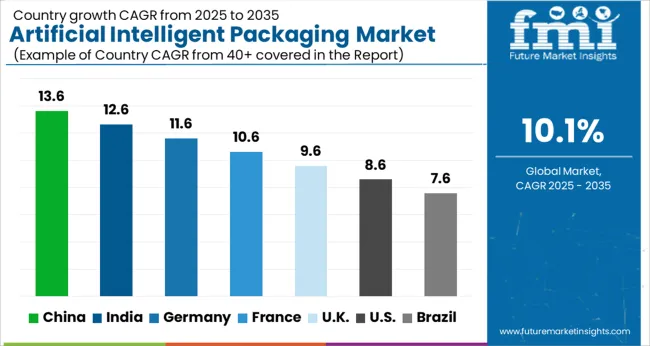
The market is projected to grow at a CAGR of 10.1% between 2025 and 2035, driven by advancements in smart labeling, sensor integration, and real-time product monitoring solutions. China is expected to lead with a 13.6% CAGR, supported by the rapid adoption of digital packaging technologies and investment in automated production lines. India follows at 12.6%, with growth fueled by rising consumer awareness and integration of traceability systems. Germany, at 11.6%, benefits from strong industrial packaging innovation and regulatory support. The UK, growing at 9.6%, emphasizes smart packaging in food and pharmaceutical sectors, while the USA, at 8.6%, experiences steady adoption through technology-driven packaging solutions. This report provides insights into 40+ countries; the top markets are highlighted here for reference.
The industry in China is projected to expand at a CAGR of 13.6% from 2025 to 2035, driven by integration of IoT-enabled sensors and smart labeling technologies. Adoption of AI-based quality control systems and automated packaging lines is increasing efficiency and reducing waste across the food and pharmaceutical industries. Major domestic packaging companies are investing in R&D to develop intelligent solutions that track product conditions in real time. Rising demand for customized packaging and enhanced supply chain visibility is further supporting market growth. Strategic partnerships between packaging manufacturers and technology providers are accelerating the deployment of intelligent systems nationwide.
India is expected to grow at a CAGR of 12.6% from 2025 to 2035, fueled by increasing demand in e-commerce and pharmaceutical sectors. AI-driven packaging systems are being deployed to monitor product integrity and shelf life, particularly for temperature-sensitive products. Government initiatives promoting digitization and smart manufacturing are encouraging adoption of intelligent packaging solutions. Local manufacturers are forming alliances with international technology providers to enhance automation and data analytics capabilities. The trend toward smart, connected packaging is expected to expand rapidly in both urban and semi-urban areas.
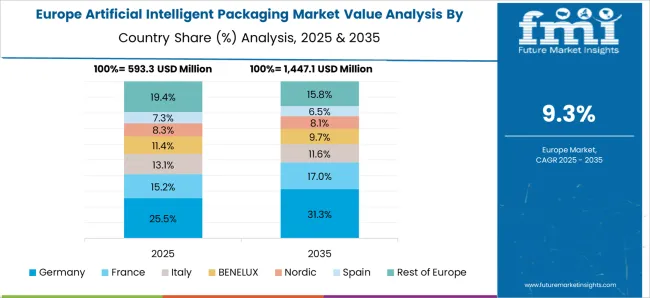
Germany’s industry is anticipated to expand at a CAGR of 11.6% from 2025 to 2035, driven by industrial automation and quality control requirements. The automotive, pharmaceutical, and food sectors are integrating AI-based packaging to monitor product conditions, ensure safety, and reduce operational costs. Regulations on traceability and product labeling are accelerating adoption of smart packaging systems. Leading manufacturers are investing in AI-driven production lines and predictive maintenance technologies to enhance efficiency. Strategic collaborations with AI solution providers are further enabling innovation and market penetration.
The industry in the United Kingdom is projected to grow at a CAGR of 9.6% from 2025 to 2035, supported by rising demand in the retail and food sectors. Companies are investing in smart labeling, IoT-enabled sensors, and data analytics for real-time monitoring of product conditions. Automation of packaging lines is reducing errors and improving efficiency, while compliance with safety and labeling regulations is encouraging adoption. Strategic partnerships with technology providers are enabling rapid deployment of intelligent solutions across major distribution centers and manufacturing hubs.
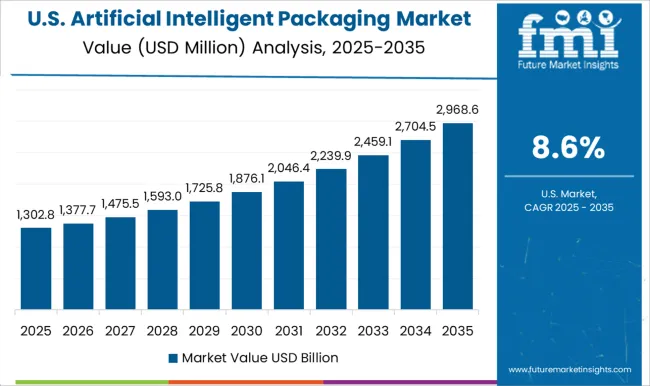
The United States industry is expected to grow at a CAGR of 8.6% from 2025 to 2035, driven by demand in pharmaceuticals, e-commerce, and consumer goods. AI-based packaging systems are improving supply chain visibility and product traceability. Leading manufacturers are investing in smart production lines and predictive analytics to optimize operations. Regulatory requirements for labeling and product safety are accelerating the adoption of intelligent solutions. Collaborative efforts between domestic and international technology providers are enhancing innovation and deployment of advanced packaging technologies nationwide.
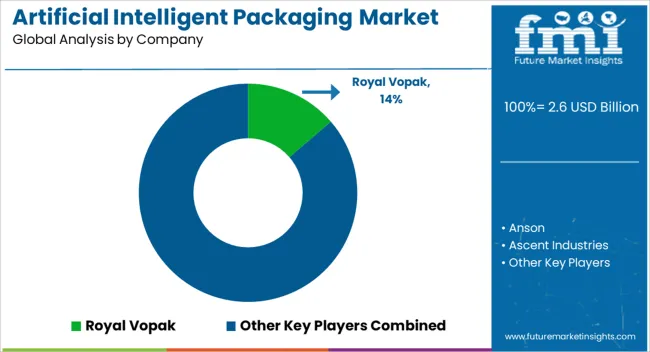
The market is rapidly evolving, driven by demands for smart labeling, product tracking, and enhanced consumer interaction. Leading players integrate sensors, RFID tags, and QR code technologies into packaging to improve supply chain visibility and product authentication. Companies like Royal Vopak and CST Industries leverage extensive manufacturing experience to explore AI-enabled packaging solutions that optimize logistics and storage. Anson and Ascent Industries focus on developing adaptive packaging systems capable of monitoring environmental conditions such as temperature, humidity, and pressure to ensure product integrity. Elixir Pro Engineering Solutions and ERGIL prioritize R&D initiatives to integrate machine learning algorithms into packaging operations, enabling predictive analytics for inventory management.
Fisher Tank and LF Manufacturing incorporate robust materials with embedded AI sensors to track product movement and consumption patterns. NOV and SHAWCOR explore end-to-end smart packaging solutions that connect IoT networks for real-time monitoring, while Roth Industries, Snyder Industries, Superior Tank, T BAILEY, and Waterford Tank & Fabrication provide tailored packaging designs suited for industrial and commercial applications. Market competition is heavily influenced by technological sophistication, regulatory compliance, and consumer-centric innovations, presenting moderate entry barriers for new entrants while established providers continue to expand through product development, strategic partnerships, and regional deployment.
| Item | Value |
|---|---|
| Quantitative Units | USD 2.6 Billion |
| Product | Fixed roof, Floating roof, Spherical, and Others |
| End Use | Crude oil, Gasoline, Aviation fuel, Middle distillates, LNG, and LPG |
| Regions Covered | North America, Europe, Asia-Pacific, Latin America, Middle East & Africa |
| Country Covered | United States, Canada, Germany, France, United Kingdom, China, Japan, India, Brazil, South Africa |
| Key Companies Profiled | Royal Vopak, Anson, Ascent Industries, CST Industries, Elixir Pro Engineering Solutions, ERGIL, Fisher Tank, LF Manufacturing, NOV, Roth Industries, SHAWCOR, Snyder Industries, Superior Tank, T BAILEY, and Waterford Tank & Fabrication |
| Additional Attributes | Dollar sales by packaging type and end-use industry, demand dynamics across food and beverage, pharmaceuticals, and consumer goods, regional trends in adoption across North America, Europe, and Asia-Pacific, innovation in sensor integration, smart labeling, and IoT-enabled tracking, environmental impact of electronic components, material recyclability, and energy consumption, and emerging use cases in real-time supply chain monitoring, freshness and quality assurance, and anti-counterfeiting solutions. |
The global artificial intelligent packaging market is estimated to be valued at USD 2.6 billion in 2025.
The market size for the artificial intelligent packaging market is projected to reach USD 6.9 billion by 2035.
The artificial intelligent packaging market is expected to grow at a 10.1% CAGR between 2025 and 2035.
The key product types in artificial intelligent packaging market are fixed roof, floating roof, spherical and others.
In terms of end use, crude oil segment to command 45.2% share in the artificial intelligent packaging market in 2025.






Our Research Products

The "Full Research Suite" delivers actionable market intel, deep dives on markets or technologies, so clients act faster, cut risk, and unlock growth.

The Leaderboard benchmarks and ranks top vendors, classifying them as Established Leaders, Leading Challengers, or Disruptors & Challengers.

Locates where complements amplify value and substitutes erode it, forecasting net impact by horizon

We deliver granular, decision-grade intel: market sizing, 5-year forecasts, pricing, adoption, usage, revenue, and operational KPIs—plus competitor tracking, regulation, and value chains—across 60 countries broadly.

Spot the shifts before they hit your P&L. We track inflection points, adoption curves, pricing moves, and ecosystem plays to show where demand is heading, why it is changing, and what to do next across high-growth markets and disruptive tech

Real-time reads of user behavior. We track shifting priorities, perceptions of today’s and next-gen services, and provider experience, then pace how fast tech moves from trial to adoption, blending buyer, consumer, and channel inputs with social signals (#WhySwitch, #UX).

Partner with our analyst team to build a custom report designed around your business priorities. From analysing market trends to assessing competitors or crafting bespoke datasets, we tailor insights to your needs.
Supplier Intelligence
Discovery & Profiling
Capacity & Footprint
Performance & Risk
Compliance & Governance
Commercial Readiness
Who Supplies Whom
Scorecards & Shortlists
Playbooks & Docs
Category Intelligence
Definition & Scope
Demand & Use Cases
Cost Drivers
Market Structure
Supply Chain Map
Trade & Policy
Operating Norms
Deliverables
Buyer Intelligence
Account Basics
Spend & Scope
Procurement Model
Vendor Requirements
Terms & Policies
Entry Strategy
Pain Points & Triggers
Outputs
Pricing Analysis
Benchmarks
Trends
Should-Cost
Indexation
Landed Cost
Commercial Terms
Deliverables
Brand Analysis
Positioning & Value Prop
Share & Presence
Customer Evidence
Go-to-Market
Digital & Reputation
Compliance & Trust
KPIs & Gaps
Outputs
Full Research Suite comprises of:
Market outlook & trends analysis
Interviews & case studies
Strategic recommendations
Vendor profiles & capabilities analysis
5-year forecasts
8 regions and 60+ country-level data splits
Market segment data splits
12 months of continuous data updates
DELIVERED AS:
PDF EXCEL ONLINE
Intelligent Packaging Market Analysis - Size, Share, and Forecast Outlook 2025 to 2035
Active & Intelligent Packaging Market Size and Share Forecast Outlook 2025 to 2035
Controlled Intelligent Packaging Market
Active, Smart, and Intelligent Packaging Market Size and Share Forecast Outlook 2025 to 2035
Market Share Distribution Among Active, Smart, and Intelligent Packaging Manufacturers
Intelligent Touch Screen Cash Register Market Size and Share Forecast Outlook 2025 to 2035
Artificial Ear Simulator Market Size and Share Forecast Outlook 2025 to 2035
Intelligent Road Test Instruments Market Size and Share Forecast Outlook 2025 to 2035
Intelligent Driving Technology Solution Market Size and Share Forecast Outlook 2025 to 2035
Packaging Supply Market Size and Share Forecast Outlook 2025 to 2035
Packaging Testing Services Market Size and Share Forecast Outlook 2025 to 2035
Packaging Tubes Market Size and Share Forecast Outlook 2025 to 2035
Artificial Intelligence (chipset) Market Forecast and Outlook 2025 to 2035
Packaging Jar Market Forecast and Outlook 2025 to 2035
Intelligent Completion Market Size and Share Market Forecast and Outlook 2025 to 2035
Packaging Barrier Film Market Size and Share Forecast Outlook 2025 to 2035
Packaging Films Market Size and Share Forecast Outlook 2025 to 2035
Packaging Laminate Market Size and Share Forecast Outlook 2025 to 2035
Intelligent Rubber Tracks Market Size and Share Forecast Outlook 2025 to 2035
Intelligent Cervical Massager Market Size and Share Forecast Outlook 2025 to 2035

Thank you!
You will receive an email from our Business Development Manager. Please be sure to check your SPAM/JUNK folder too.
Chat With
MaRIA